初中英语常见副词及易错副词整理
初中英语副词知识点
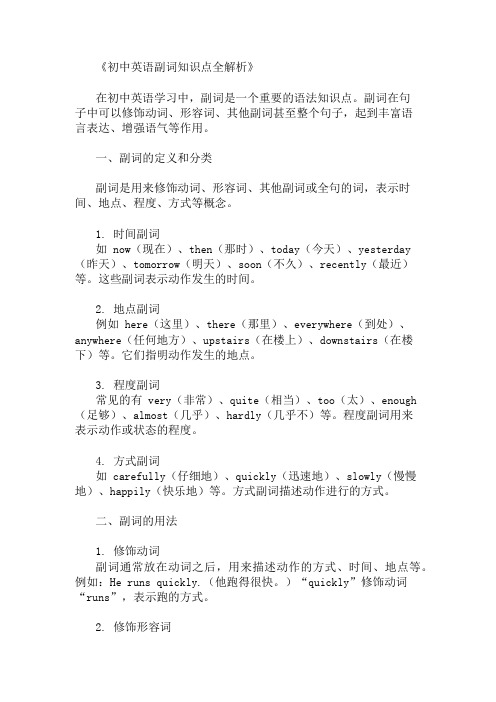
《初中英语副词知识点全解析》在初中英语学习中,副词是一个重要的语法知识点。
副词在句子中可以修饰动词、形容词、其他副词甚至整个句子,起到丰富语言表达、增强语气等作用。
一、副词的定义和分类副词是用来修饰动词、形容词、其他副词或全句的词,表示时间、地点、程度、方式等概念。
1. 时间副词如 now(现在)、then(那时)、today(今天)、yesterday (昨天)、tomorrow(明天)、soon(不久)、recently(最近)等。
这些副词表示动作发生的时间。
2. 地点副词例如 here(这里)、there(那里)、everywhere(到处)、anywhere(任何地方)、upstairs(在楼上)、downstairs(在楼下)等。
它们指明动作发生的地点。
3. 程度副词常见的有 very(非常)、quite(相当)、too(太)、enough (足够)、almost(几乎)、hardly(几乎不)等。
程度副词用来表示动作或状态的程度。
4. 方式副词如 carefully(仔细地)、quickly(迅速地)、slowly(慢慢地)、happily(快乐地)等。
方式副词描述动作进行的方式。
二、副词的用法1. 修饰动词副词通常放在动词之后,用来描述动作的方式、时间、地点等。
例如:He runs quickly.(他跑得很快。
)“quickly”修饰动词“runs”,表示跑的方式。
2. 修饰形容词副词可以放在形容词之前,用来加强或减弱形容词的程度。
例如:She is very beautiful.(她非常漂亮。
)“very”修饰形容词“beautiful”,增强了“漂亮”的程度。
3. 修饰其他副词副词还可以修饰其他副词。
例如:He runs extremely quickly.(他跑得极其快。
)“extremely”修饰副词“quickly”,进一步强调了跑的速度之快。
4. 修饰整个句子有些副词可以放在句首或句末,用来修饰整个句子,表示说话人的态度、看法等。
中考词汇分类副词
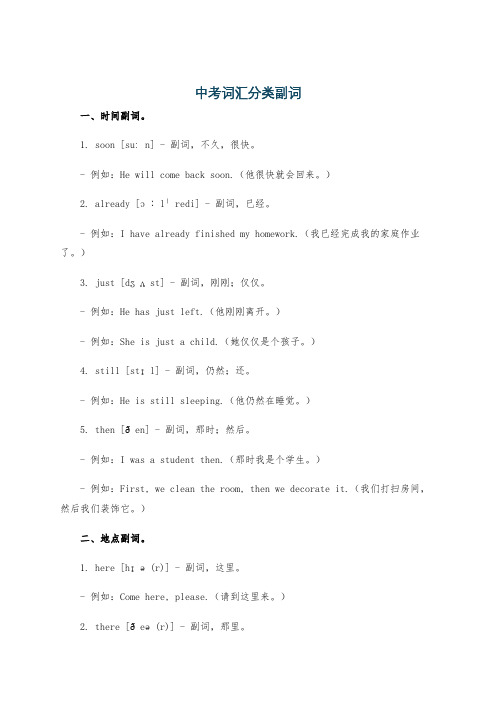
中考词汇分类副词一、时间副词。
1. soon [suːn] - 副词,不久,很快。
- 例如:He will come back soon.(他很快就会回来。
)2. already [ɔːlˈredi] - 副词,已经。
- 例如:I have already finished my homework.(我已经完成我的家庭作业了。
)3. just [dʒʌst] - 副词,刚刚;仅仅。
- 例如:He has just left.(他刚刚离开。
)- 例如:She is just a child.(她仅仅是个孩子。
)4. still [stɪl] - 副词,仍然;还。
- 例如:He is still sleeping.(他仍然在睡觉。
)5. then [ðen] - 副词,那时;然后。
- 例如:I was a student then.(那时我是个学生。
)- 例如:First, we clean the room, then we decorate it.(我们打扫房间,然后我们装饰它。
)二、地点副词。
1. here [hɪə(r)] - 副词,这里。
- 例如:Come here, please.(请到这里来。
)2. there [ðeə(r)] - 副词,那里。
- 例如:There is a book on the desk.(桌子上有一本书。
)3. everywhere [ˈevriweə(r)] - 副词,到处;处处。
- 例如:I can see flowers everywhere in spring.(在春天我到处都能看到花。
)4. nowhere [ˈnəʊweə(r)] - 副词,无处;哪里都不。
- 例如:There is nowhere to hide.(无处可藏。
)三、方式副词。
1. carefully [ˈkeəfəli] - 副词,仔细地;小心地。
- 例如:He reads the book carefully.(他仔细地读书。
初中英语语法知识精讲:常用副词考法归纳6

初中英语语法知识精讲:常用副词考法归纳6英语副词的分类(1) 时间副词:常见的有now, then, soon, ago, recently, lately, later, before, early, today, tomorrow, yesterday, tonight, suddenly, immediately, still, already, just等。
如:An idea suddenly struck me.我心中忽然产生一个念头。
(2) 地点副词:常见的有here, there, up, down, away, nearby, home, ahead, abroad, indoors, overseas, upstairs, downstairs 等。
如:I am considering going abroad.我正在考虑出国。
(3) 方式副词:表示行为方式的副词大多以-ly结尾,常见的有quietly, heavily, warmly, carefully, happily, politely, angrily等。
如:Look at the picture carefully.仔细看这幅画。
(4) 频度副词:常见的有always, usually, often, frequently, constantly, occasionally, sometimes, seldom, hardly, rarely, never等。
Sometimes he gets up early.他有时起得早。
(5) 程度副词:常见的有fairly, pretty, rather, quite, very, much, too, greatly, almost, nearly, half, highly, deeply, partly, perfectly, really等。
如:The film was quite good.这个电影不错。
七年级英语副词知识点归纳
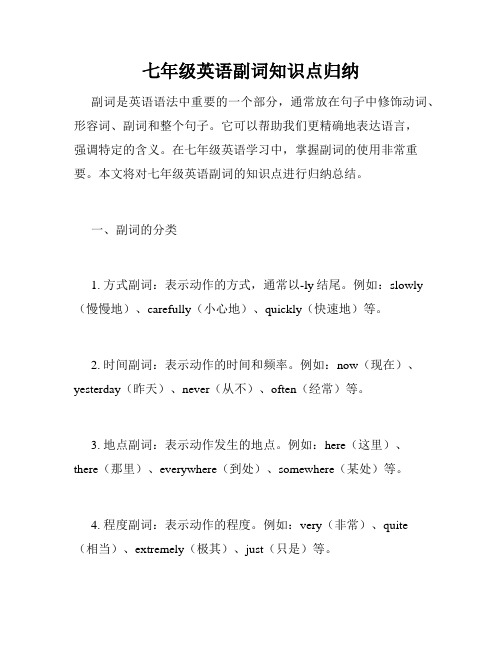
七年级英语副词知识点归纳副词是英语语法中重要的一个部分,通常放在句子中修饰动词、形容词、副词和整个句子。
它可以帮助我们更精确地表达语言,强调特定的含义。
在七年级英语学习中,掌握副词的使用非常重要。
本文将对七年级英语副词的知识点进行归纳总结。
一、副词的分类1. 方式副词:表示动作的方式,通常以-ly结尾。
例如:slowly (慢慢地)、carefully(小心地)、quickly(快速地)等。
2. 时间副词:表示动作的时间和频率。
例如:now(现在)、yesterday(昨天)、never(从不)、often(经常)等。
3. 地点副词:表示动作发生的地点。
例如:here(这里)、there(那里)、everywhere(到处)、somewhere(某处)等。
4. 程度副词:表示动作的程度。
例如:very(非常)、quite(相当)、extremely(极其)、just(只是)等。
二、副词的使用1. 位置:通常放在动词之后,如:She sings well.(她唱得好。
)但是如果修饰整个句子,则放在句首或结尾。
例如:Luckily, I found my keys.(幸运的是,我找到了我的钥匙。
)2. 修饰形容词:例如:He is extremely handsome.(他非常帅气。
)3. 修饰副词:例如:She speaks English very well.(她英语说得非常好。
)4. 修饰整个句子:例如:Fortunately, the weather is good.(幸运的是,天气很好。
)三、副词的比较级和最高级1. 比较级:用于表示两个事物之间的比较。
一般在形容词和副词后面加-er或-more。
例如:She sings more beautifully than her sister.(她唱歌比她妹妹更好听。
)2. 最高级:用于表示三个或三个以上事物之间的比较。
一般在形容词和副词前面加the most或the -est。
初中英语复习:副词

初中英语复习:副词副词知识点总结用来修饰动词、形容词及其他副词的词称为副词。
副词可表示时间、地点、程度、方式等概念,多作状语,可用作定语和表语。
副词也有原级、比较级和最高级。
对于副词的考查多集中在三个方面:1. 副词的比较等级; 2. 近义副词词义辨析 ;3.副词与形容词的区别使用。
在学习过程中,要掌握副词比较等级的各种变化形式,同时分清近义副词的用法近义副词的用法。
知识点 1 副词的分类分类时间副词地点副词方式副词程度副词频度副词用法例词表示时间now 现在 ;today 今天 ;soon很快 ;ago 以前表示地点there 那里 ;here 这里 ;out 在外边 ;up 在上边描述动作发slowly 缓慢地 ;quickly 迅速生的方式地;carefully 细心地描述行为、too 太;really 的确 ;quite 相动作或状态当;little 很少地的程度表示一定时always 总是 ;often 经2间内动作发常;sometimes 有时生的次数用来构成特why 为什么 ;where 在哪疑问副词殊疑问句里 ;when 什么时候 ;how (词组)long多长 ;how much 多少钱关系副词用来引导定where 的地方 ;when 的语从句时候 ;why""" 的原因知识点 2 副词的构成构成例词与形容词同形early 早(期)地;hard 努力地;late 迟,晚;high 高高地形容词后直接加 ly quick → quickly 迅速地 ;slow → slowly 缓慢地;careful →carefully 细心地 ;beautiful → beautifully漂亮地以 y 结尾的形容词,把lucky → luckily 幸运y 改为 i,再加 ly 地;easy→easily 容易地 ;happy → happily 快乐3地;busy →busily 繁忙地元音字母加 e 结尾的形容词,去掉 e,再加 ly 以 le 结尾的形容词,去掉 e,再加 y true →truly 真实地possible→possibly 可能地 ; comfortable→comfortably 舒服地其他形式的副词often 经常 ;too 太;very 非常知识点 3 副词的句法功能成说明分修饰动词作状修饰形容语词修饰其他副词修饰整个句子作主要指主例句He works very hard on his subject. 他努力攻克自己的课题。
人教版九年级英语全一册 副词表
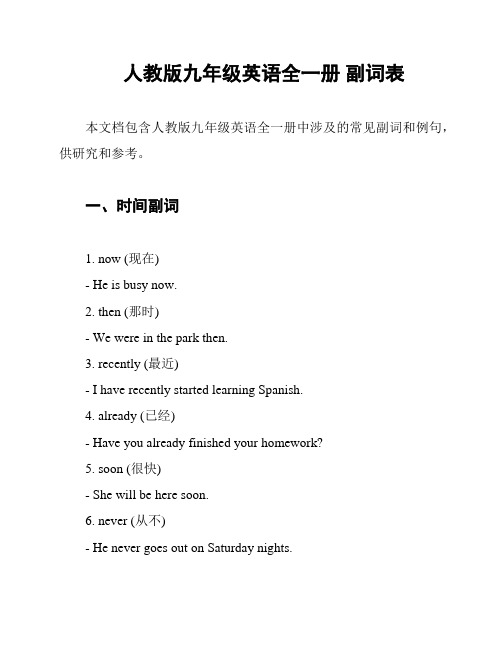
人教版九年级英语全一册副词表本文档包含人教版九年级英语全一册中涉及的常见副词和例句,供研究和参考。
一、时间副词1. now (现在)- He is busy now.2. then (那时)- We were in the park then.3. recently (最近)- I have recently started learning Spanish.4. already (已经)- Have you already finished your homework?5. soon (很快)- She will be here soon.6. never (从不)- He never goes out on Saturday nights.二、地点副词1. here (这里)2. there (那里)- He is not there anymore.3. everywhere (到处)- The flowers are blooming everywhere.4. nowhere (无处)- I can find the book nowhere.5. abroad (国外)- She has been working abroad for two years.三、方式副词1. carefully (仔细地)- He read the instructions carefully.2. quickly (快速地)- She finished the race quickly.3. slowly (慢慢地)- He walked slowly in the park.4. quietly (安静地)- The students were working quietly in the classroom.5. loudly (大声地)- He shouted loudly in excitement.四、频率副词1. always (总是)- She always helps her friends when they need her. 2. often (经常)- He often goes to the gym after work.3. sometimes (有时候)- Sometimes it rains heavily in summer.4. never (从不)- He never drinks coffee before bedtime.5. rarely (很少)- I rarely eat fast food.五、程度副词1. very (非常)- The movie was very interesting.2. quite (相当)- The exam was quite difficult.3. too (太)- It's too cold to go swimming today.4. so (如此)- The pizza was so delicious that I ate too much.5. enough (足够)- She is old enough to start driving.六、疑问副词1. why (为什么)- Why did you quit your job?2. when (什么时候)3. where (在哪里)- Where is the nearest hospital?4. how (如何)- How did you learn to play the piano?5. what (什么)- What is your favorite color?七、连接副词1. however (然而)- He is not very intelligent. However, he is a hard worker.2. therefore (因此)- He didn't study and therefore he failed the test.3. otherwise (否则)- Please turn off the lights, otherwise the battery will die.4. moreover (此外)- She is very smart. Moreover, she is kind-hearted.5. nevertheless (然而)- The weather is bad. Nevertheless, I will go for a walk.以上是人教版九年级英语全一册中常见的副词和例句,希望对大家有所帮助。
初中英语常见的副词归纳
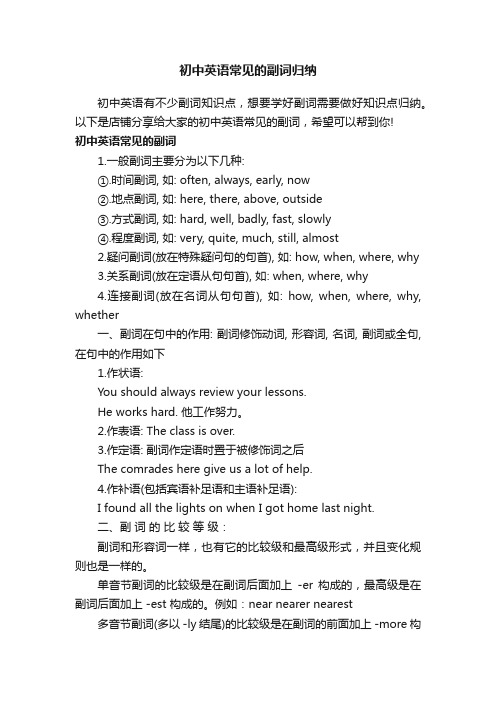
初中英语常见的副词归纳初中英语有不少副词知识点,想要学好副词需要做好知识点归纳。
以下是店铺分享给大家的初中英语常见的副词,希望可以帮到你!初中英语常见的副词1.一般副词主要分为以下几种:①.时间副词, 如: often, always, early, now②.地点副词, 如: here, there, above, outside③.方式副词, 如: hard, well, badly, fast, slowly④.程度副词, 如: very, quite, much, still, almost2.疑问副词(放在特殊疑问句的句首), 如: how, when, where, why3.关系副词(放在定语从句句首), 如: when, where, why4.连接副词(放在名词从句句首), 如: how, when, where, why, whether一、副词在句中的作用: 副词修饰动词, 形容词, 名词, 副词或全句, 在句中的作用如下1.作状语:You should always review your lessons.He works hard. 他工作努力。
2.作表语: The class is over.3.作定语: 副词作定语时置于被修饰词之后The comrades here give us a lot of help.4.作补语(包括宾语补足语和主语补足语):I found all the lights on when I got home last night.二、副词的比较等级:副词和形容词一样,也有它的比较级和最高级形式,并且变化规则也是一样的。
单音节副词的比较级是在副词后面加上-er 构成的,最高级是在副词后面加上 -est 构成的。
例如:near nearer nearest多音节副词(多以 -ly 结尾)的比较级是在副词的前面加上 -more 构成的。
最高级是在副词前面加上-most 构成的.例如;warmly more warmly most warmly有些副词的比较级和最高级形式是不规则的:well-better - best little - less - leastmuch- more - most badly - worse - worstfar-farther(further)-farthest(furthest)副词的比较级和最高级用法同形容词的比较级用法基本一样,两者比较用比较级,三者或以上用最高级,但是副词最高级形式句中the 可以省略。
七年级英语副词知识点

七年级英语副词知识点副词是英语语法中的一个重要概念,指的是修饰动词、形容词、副词等词性的一类词汇。
在英语中,副词的作用非常广泛,能够改变句子的语气、强调语句的重要性、描述事物的状态等等。
下面就让我们一起来学习一下七年级英语中的副词知识点吧!1. 副词的定义在英语中,副词是修饰动词、形容词、副词等词性的一种词汇。
它不仅可以修饰单个词汇,也可以修饰整个句子。
常见的副词有时间副词、频率副词、方式副词、程度副词等。
2. 时间副词时间副词通常用来描述一个动作或事件在时间上的发生情况,常见的时间副词有:- Always(总是)- Never(从不)- Often(经常)- Sometimes(有时)- Usually(通常)- Early(早)- Late(晚)- Now(现在)- Soon(很快)3. 频率副词频率副词用来描述一个动作或事件发生的频率,常见的频率副词有:- Always(总是)- Never(从不)- Occasionally(偶尔)- Rarely(很少)- Often(经常)- Sometimes(有时)- Usually(通常)4. 方式副词方式副词用来描述一个动作或事件发生的方式或方式,常见的方式副词有:- Fast(快速地)- Slowly(慢慢地)- Quietly(安静地)- Loudly(响亮地)- Briskly(轻快地)- Cautiously(小心地)- Confidently(自信地)- Carefully(小心地)5. 程度副词程度副词用来描述一个动作或事件的程度或强度,常见的程度副词有:- Very(非常)- Completely(完全地)- Partially(部分地)- Slightly(稍微)- Totally(完全)- Utterly(完全)- Extremely(极其)- Highly(非常)6. 副词的位置在句子中,副词的位置通常需要放在所修饰的词语之前或之后。
(完整版)初中英语副词不规则变化归纳表
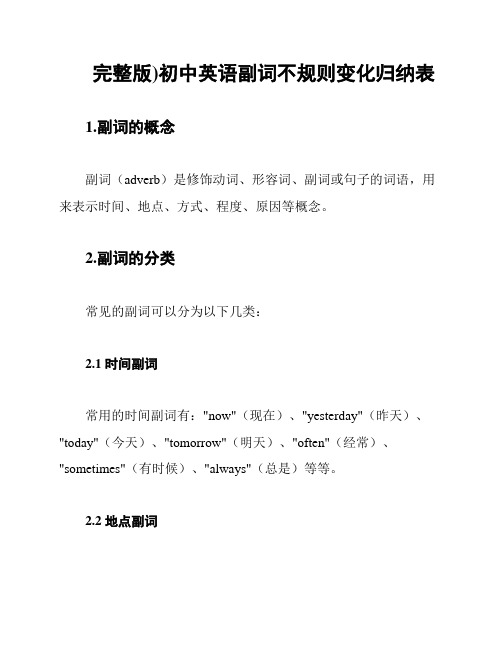
完整版)初中英语副词不规则变化归纳表1.副词的概念副词(adverb)是修饰动词、形容词、副词或句子的词语,用来表示时间、地点、方式、程度、原因等概念。
2.副词的分类常见的副词可以分为以下几类:2.1 时间副词常用的时间副词有:"now"(现在)、"yesterday"(昨天)、"today"(今天)、"tomorrow"(明天)、"often"(经常)、"sometimes"(有时候)、"always"(总是)等等。
2.2 地点副词常见的地点副词有:"here"(这里)、"there"(那里)、"everywhere"(到处)、"nowhere"(任何地方都不)、"home"(家中)等等。
2.3 方式副词常用的方式副词有:"quickly"(快速地)、"slowly"(慢慢地)、"carefully"(小心地)、"loudly"(大声地)、"softly"(轻轻地)等等。
2.4 程度副词常见的程度副词有:"very"(非常)、"really"(真的)、"quite"(相当)、"too"(太)、"almost"(几乎)、"hardly"(几乎不)等等。
2.5 原因副词常用的原因副词有:"because"(因为)、"so"(所以)、"therefore"(因此)、"thus"(因此)、"consequently"(因此)、"hence"(因此)等等。
初中英语语法---副词
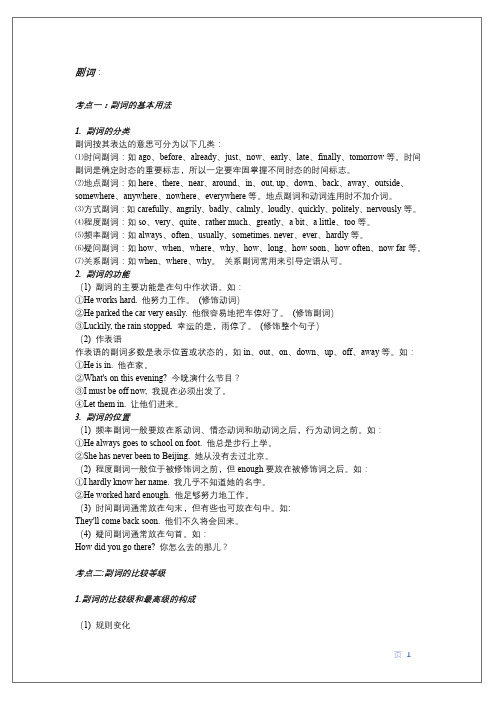
副词:考点一:副词的基本用法1. 副词的分类副词按其表达的意思可分为以下几类:⑴时间副词:如ago、before、already、just、now、early、late、finally、tomorrow等。
时间副词是确定时态的重要标志,所以一定要牢固掌握不同时态的时间标志。
⑵地点副词:如here、there、near、around、in、out, up、down、back、away、outside、somewhere、anywhere、nowhere、everywhere等。
地点副词和动词连用时不加介词。
⑶方式副词:如carefully、angrily、badly、calmly、loudly、quickly、politely、nervously等。
⑷程度副词:如so、very、quite、rather much、greatly、a bit、a little、too等。
⑸频率副词:如always、often、usually、sometimes. never、ever、hardly等。
⑹疑问副词:如how、when、where、why、how、long、how soon、how often、now far等。
⑺关系副词:如when、where、why。
关系副词常用来引导定语从可。
2. 副词的功能(1) 副词的主要功能是在句中作状语。
如:①He works hard. 他努力工作。
(修饰动词)②He parked the car very easily. 他很容易地把车停好了。
(修饰副词)③Luckily, the rain stopped. 幸运的是,雨停了。
(修饰整个句子)(2) 作表语作表语的副词多数是表示位置或状态的,如in、out、on、down、up、off、away等。
如:①He is in. 他在家。
②What's on this evening? 今晚演什么节目?③I must be off now, 我现在必须出发了。
学习正确运用副词的语法知识
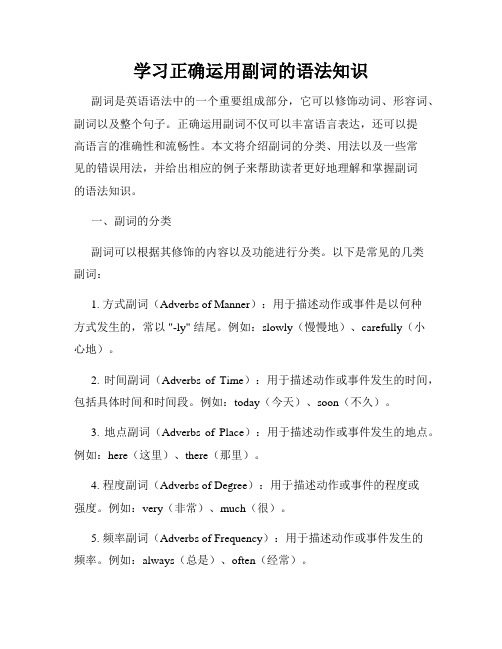
学习正确运用副词的语法知识副词是英语语法中的一个重要组成部分,它可以修饰动词、形容词、副词以及整个句子。
正确运用副词不仅可以丰富语言表达,还可以提高语言的准确性和流畅性。
本文将介绍副词的分类、用法以及一些常见的错误用法,并给出相应的例子来帮助读者更好地理解和掌握副词的语法知识。
一、副词的分类副词可以根据其修饰的内容以及功能进行分类。
以下是常见的几类副词:1. 方式副词(Adverbs of Manner):用于描述动作或事件是以何种方式发生的,常以 "-ly" 结尾。
例如:slowly(慢慢地)、carefully(小心地)。
2. 时间副词(Adverbs of Time):用于描述动作或事件发生的时间,包括具体时间和时间段。
例如:today(今天)、soon(不久)。
3. 地点副词(Adverbs of Place):用于描述动作或事件发生的地点。
例如:here(这里)、there(那里)。
4. 程度副词(Adverbs of Degree):用于描述动作或事件的程度或强度。
例如:very(非常)、much(很)。
5. 频率副词(Adverbs of Frequency):用于描述动作或事件发生的频率。
例如:always(总是)、often(经常)。
二、副词的用法副词的位置通常放在动词之前,如:She sings beautifully(她唱得很美)。
但有些副词需要放在句首或句尾,这取决于其修饰的对象。
例如:1. 在句首修饰整个句子时,常用于引导时间、地点或方式。
例如:Yesterday, they went to the park together(昨天,他们一起去了公园)。
2. 在句尾修饰整个句子时,表示说话人的态度或感情。
例如:She did it well, indeed(她确实做得很好)。
3. 在句中修饰形容词或副词时,通常放在它们之前。
例如:He is extremely intelligent(他非常聪明)。
初中英语常见副词及易错副词整理(K12教育文档)
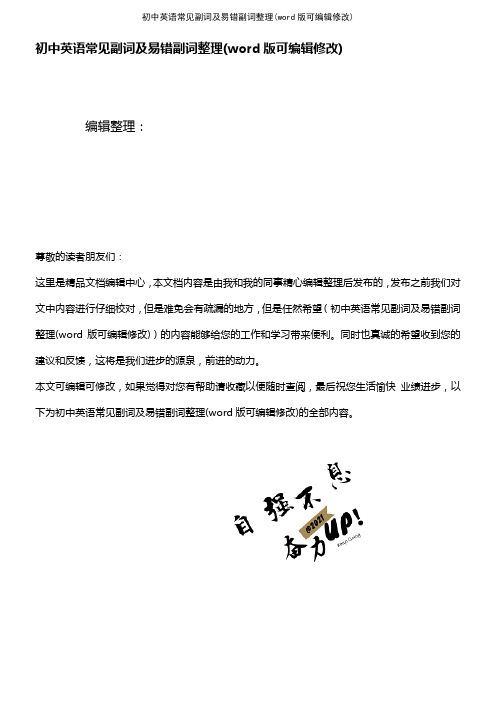
初中英语常见副词及易错副词整理(word版可编辑修改)编辑整理:尊敬的读者朋友们:这里是精品文档编辑中心,本文档内容是由我和我的同事精心编辑整理后发布的,发布之前我们对文中内容进行仔细校对,但是难免会有疏漏的地方,但是任然希望(初中英语常见副词及易错副词整理(word版可编辑修改))的内容能够给您的工作和学习带来便利。
同时也真诚的希望收到您的建议和反馈,这将是我们进步的源泉,前进的动力。
本文可编辑可修改,如果觉得对您有帮助请收藏以便随时查阅,最后祝您生活愉快业绩进步,以下为初中英语常见副词及易错副词整理(word版可编辑修改)的全部内容。
一、副词的分类副词按词汇意义可分为:方式副词:well,fast,slowly,carefully,quickly,suddenly,程度副词:very, much, enough, almost, rather, quite, too,so地点副词:here,there,out,outside, inside, upstairs, somewhere,abroad, home, near,away, back,时间副词:today,early,soon,now,then,recently,still, yesterday, before,ago, immediately, lately, already, yet频度副词:always,often,usually,sometimes,seldom,ever, never否定副词:no,not,neither,nor,疑问副词:where, how, why, how, how long 其他:also,too,only 二,注意下列副词的不同含义(一些副词与形容词同型,表示具体的含义)high高地 highly高度地 wide宽的widely广泛的deep深地 deeply深深地 close近地 closly仔细地,严密地1,He opened the door 。
初中英语副词的知识点总结
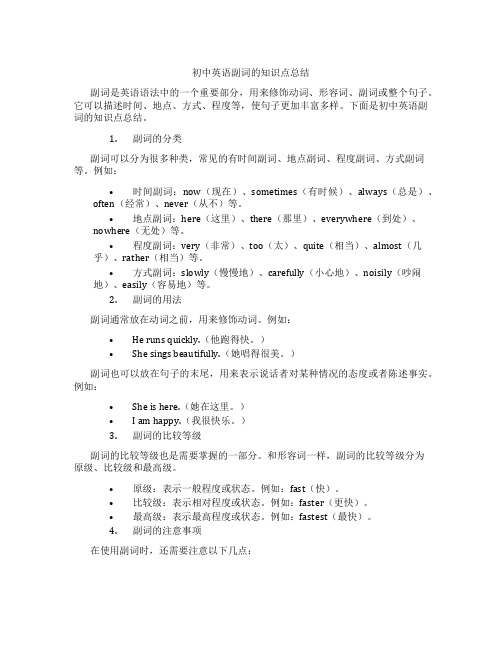
初中英语副词的知识点总结副词是英语语法中的一个重要部分,用来修饰动词、形容词、副词或整个句子。
它可以描述时间、地点、方式、程度等,使句子更加丰富多样。
下面是初中英语副词的知识点总结。
1.副词的分类副词可以分为很多种类,常见的有时间副词、地点副词、程度副词、方式副词等。
例如:•时间副词:now(现在)、sometimes(有时候)、always(总是)、often(经常)、never(从不)等。
•地点副词:here(这里)、there(那里)、everywhere(到处)、nowhere(无处)等。
•程度副词:very(非常)、too(太)、quite(相当)、almost(几乎)、rather(相当)等。
•方式副词:slowly(慢慢地)、carefully(小心地)、noisily(吵闹地)、easily(容易地)等。
2.副词的用法副词通常放在动词之前,用来修饰动词。
例如:•He runs quickly.(他跑得快。
)•She sings beautifully.(她唱得很美。
)副词也可以放在句子的末尾,用来表示说话者对某种情况的态度或者陈述事实。
例如:•She is here.(她在这里。
)•I am happy.(我很快乐。
)3.副词的比较等级副词的比较等级也是需要掌握的一部分。
和形容词一样,副词的比较等级分为原级、比较级和最高级。
•原级:表示一般程度或状态。
例如:fast(快)。
•比较级:表示相对程度或状态。
例如:faster(更快)。
•最高级:表示最高程度或状态。
例如:fastest(最快)。
4.副词的注意事项在使用副词时,还需要注意以下几点:•当副词修饰形容词或副词时,一般要在副词前面加上程度副词。
例如:very quickly(非常快)。
•副词的位置也需要注意。
一般情况下,副词放在动词之前,但有些副词可以放在句子的开头或末尾。
例如:She often goes to the park.(她经常去公园。
初中英语中的常见副词解析
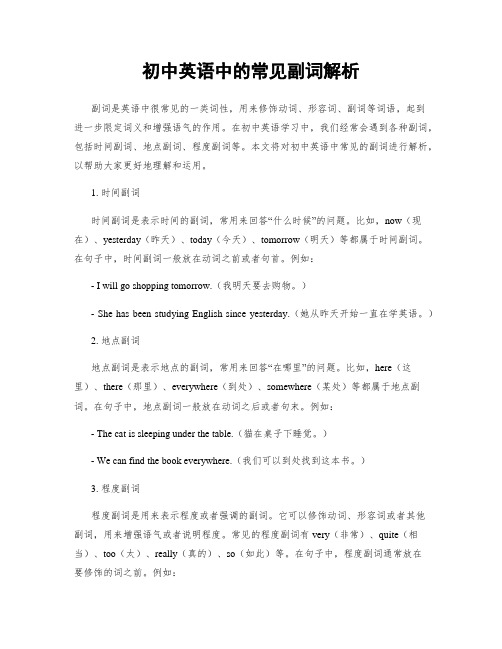
初中英语中的常见副词解析副词是英语中很常见的一类词性,用来修饰动词、形容词、副词等词语,起到进一步限定词义和增强语气的作用。
在初中英语学习中,我们经常会遇到各种副词,包括时间副词、地点副词、程度副词等。
本文将对初中英语中常见的副词进行解析,以帮助大家更好地理解和运用。
1. 时间副词时间副词是表示时间的副词,常用来回答“什么时候”的问题。
比如,now(现在)、yesterday(昨天)、today(今天)、tomorrow(明天)等都属于时间副词。
在句子中,时间副词一般放在动词之前或者句首。
例如:- I will go shopping tomorrow.(我明天要去购物。
)- She has been studying English since yesterday.(她从昨天开始一直在学英语。
)2. 地点副词地点副词是表示地点的副词,常用来回答“在哪里”的问题。
比如,here(这里)、there(那里)、everywhere(到处)、somewhere(某处)等都属于地点副词。
在句子中,地点副词一般放在动词之后或者句末。
例如:- The cat is sleeping under the table.(猫在桌子下睡觉。
)- We can find the book everywhere.(我们可以到处找到这本书。
)3. 程度副词程度副词是用来表示程度或者强调的副词。
它可以修饰动词、形容词或者其他副词,用来增强语气或者说明程度。
常见的程度副词有very(非常)、quite(相当)、too(太)、really(真的)、so(如此)等。
在句子中,程度副词通常放在要修饰的词之前。
例如:- The movie is very interesting.(这部电影非常有趣。
)- He is really smart.(他真聪明。
)- The cake is too sweet for me.(这个蛋糕对我来说太甜了。
初中英语知识点归纳常见的副词短语用法总结
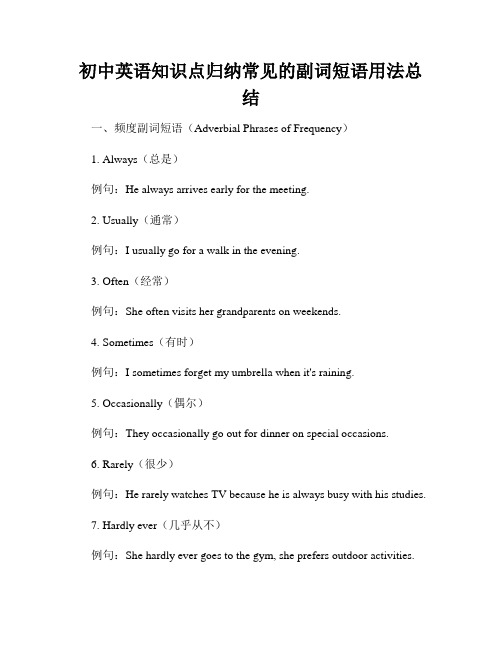
初中英语知识点归纳常见的副词短语用法总结一、频度副词短语(Adverbial Phrases of Frequency)1. Always(总是)例句:He always arrives early for the meeting.2. Usually(通常)例句:I usually go for a walk in the evening.3. Often(经常)例句:She often visits her grandparents on weekends.4. Sometimes(有时)例句:I sometimes forget my umbrella when it's raining.5. Occasionally(偶尔)例句:They occasionally go out for dinner on special occasions.6. Rarely(很少)例句:He rarely watches TV because he is always busy with his studies.7. Hardly ever(几乎从不)例句:She hardly ever goes to the gym, she prefers outdoor activities.8. Never(从不)例句:They never miss a chance to travel during summer vacation.二、时间副词短语(Adverbial Phrases of Time)1. In the morning/afternoon/evening(在早晨/下午/晚上)例句:I exercise in the morning before going to work.2. On weekdays/weekends(在工作日/周末)例句:I have to work on weekdays but I relax on weekends.3. At night(在晚上)例句:They like to stargaze at night in their backyard.4. By the end of(到...结束)例句:She will finish her project by the end of next week.5. In the meantime(与此同时)例句:While waiting for the bus, he read a book in the meantime.6. At the same time(同时)例句:They arrived at the party at the same time.7. From time to time(时常)例句:He visits his grandparents from time to time.8. All day/night long(整天/整晚)例句:They were dancing all night long at the party.三、地点副词短语(Adverbial Phrases of Place)1. In the park(在公园)例句:They often have picnics in the park on weekends.2. At school(在学校)例句:I met my friends at school during lunch break.3. On the beach(在海滩)例句:They love swimming and sunbathing on the beach.4. In the city/countryside(在城市/农村)例句:She enjoys the tranquility of living in the countryside.5. At home(在家)例句:He spends most of his weekends at home with his family. 6. On the way(在路上)例句:They had a great conversation on the way to the airport. 7. Across the road(在马路对面)例句:The supermarket is just across the road, it's very convenient.四、方式副词短语(Adverbial Phrases of Manner)1. In a hurry(匆忙地)例句:She left the house in a hurry because she was late for work.2. With pleasure(乐意地)例句:I will help you move next week, with pleasure.3. In a loud voice(大声地)例句:He shouted in a loud voice to get the attention of the audience.4. On purpose(故意地)例句:He spilled the drink on purpose to annoy his sister.5. By accident(偶然地)例句:I found this lost wallet by accident while walking in the park.6. In a funny way(滑稽地)例句:He imitates his teacher in a funny way and makes everyone laugh.7. In a serious manner(严肃地)例句:The teacher spoke to the students in a serious manner about their behavior.总结:副词短语在英语中起到修饰动词、形容词、副词和整个句子的作用,能够更准确地表达出时间、地点、方式和频率等信息。
英语语法副词归纳总结

英语语法副词归纳总结在英语语法中,副词是一类非常重要的词性,用于描述动词、形容词、其他副词或整个句子的性质、方式、时间、频率等。
本文将对常见的英语语法副词进行归纳总结,帮助读者更好地掌握和运用这些副词。
一、修饰动词的副词1. 副词修饰动词的方式:- 模糊副词:例如maybe(或许)、possibly(可能)、probably (大概)等,表示不确定或可能性较大。
- 频率副词:例如always(总是)、usually(通常)、often(经常)、sometimes(有时)、seldom(很少)、never(从不)等,表示动作或状态发生的频率。
- 程度副词:例如very(非常)、quite(相当)、too(太)、enough(足够)、extremely(极其)等,表示动作或状态的程度或强度。
- 方式副词:例如slowly(慢慢地)、carefully(小心地)、loudly(大声地)、happily(快乐地)等,表示动作发生的方式。
- 时间副词:例如now(现在)、then(然后)、today(今天)、yesterday(昨天)等,表示动作发生的时间。
2. 一些常见的修饰动词的副词:- go(去):already(已经)、soon(很快)、away(走开)、back(返回)等。
- do(做):well(好)、badly(糟糕地)、carefully(小心地)、fast(快速地)等。
- speak(说):loudly(大声地)、clearly(清楚地)、fluently(流利地)、softly(轻声地)等。
- eat(吃):slowly(慢慢地)、quickly(快速地)、heartily(饱餐一顿地)等。
- sleep(睡觉):well(好)、soundly(沉睡地)、peacefully(平静地)等。
二、修饰形容词的副词1. 副词修饰形容词的方式:- 程度副词:例如very(非常)、quite(相当)、extremely(极其)等,表示形容词的程度。
初中英语中考语法复习副词知识点
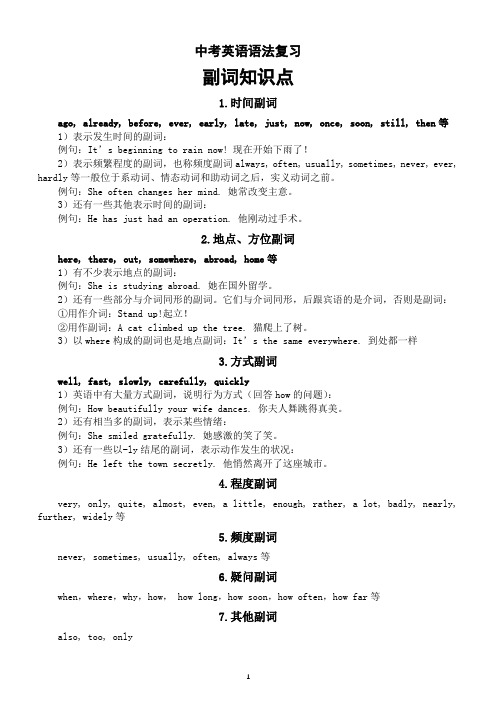
中考英语语法复习副词知识点1.时间副词ago, already, before, ever, early, late, just, now, once, soon, still, then等1)表示发生时间的副词:例句:It’s beginning to rain now! 现在开始下雨了!2)表示频繁程度的副词,也称频度副词always, often, usually, sometimes, never, ever, hardly等一般位于系动词、情态动词和助动词之后,实义动词之前。
例句:She often changes her mind. 她常改变主意。
3)还有一些其他表示时间的副词:例句:He has just had an operation. 他刚动过手术。
2.地点、方位副词here, there, out, somewhere, abroad, home等1)有不少表示地点的副词:例句:She is studying abroad. 她在国外留学。
2)还有一些部分与介词同形的副词。
它们与介词同形,后跟宾语的是介词,否则是副词:①用作介词:Stand up!起立!②用作副词:A cat climbed up the tree. 猫爬上了树。
3)以where构成的副词也是地点副词:It’s the same everywhere. 到处都一样3.方式副词well, fast, slowly, carefully, quickly1)英语中有大量方式副词,说明行为方式(回答how的问题):例句:How beautifully your wife dances. 你夫人舞跳得真美。
2)还有相当多的副词,表示某些情绪:例句:She smiled gratefully. 她感激的笑了笑。
3)还有一些以-ly结尾的副词,表示动作发生的状况:例句:He left the town secretly. 他悄然离开了这座城市。
初中英语易错知识点辨析副词

初中英语易错知识点辨析副词1. Hardly / Barely- Hardly means almost not at all or almost not possible. It is used to describe something that is extremely difficult or unlikely to happen.Example: He could hardly breathe after running a marathon.- Barely means only just or almost not. It is used to describe something that is just enough or just reaching acertain level.Example: She could barely reach the top shelf in the kitchen.2. Afterward / AfterwardsExample: They went to the park and afterward had lunch at a nearby restaurant.3. Already / All readyExample: I have already finished my homework.Example: The team is all ready for the match.4. Quite / QuietExample: The movie was quite interesting.- Quiet means calm, silent, or not making noise. It is used to describe a lack of noise or disturbance.Example: Please be quiet in the library.5. Nearly / Almost- Nearly means almost or very close to. It is used to describe something that is very close to a particular state or condition.Example: I have nearly finished my project.- Almost means nearly or very close to. It is used to describe something that is not quite reaching a particular state or condition.。
八年级常用的副词知识点

八年级常用的副词知识点副词是我们日常生活和学习中经常使用的一种词类,它可以修饰动词、形容词、副词,表示时间、地点、程度、方式等语法意义。
在英语中,副词属于比较难掌握的语法知识点之一,因此在八年级英语学习中也是一个重要的内容。
下面就跟随本文,了解一下八年级常用的副词知识点吧!一、修饰动词的副词1. 时间副词时间副词主要用来表示动作发生的时间或频率,如:always(总是)、often(经常)、usually(通常)、sometimes(有时)、rarely(很少)、never(从不)等。
例如:He always studies hard.(他总是努力学习。
)She never misses a class.(她从不缺课。
)2. 地点副词地点副词主要用来表示动作发生的位置或方向,如:here(这里)、there(那里)、up(向上)、down(向下)、in(在里面)、out(在外面)等。
例如:He put the book down on the table.(他把书放在桌子上。
)She walked into the room.(她走进了房间。
)3. 程度副词程度副词主要用来表示动作的强度或程度,如:very(非常)、quite(相当)、too(过于)、enough(足够)、almost(几乎)等。
例如:She is very good at singing.(她唱歌非常好。
)He is almost as tall as his father.(他和他的父亲差不多一样高。
)二、修饰形容词的副词1. 程度副词前面已经提到了,程度副词可以不仅可以修饰动词,还可以修饰形容词。
用来表示形容词的程度,如:very(非常)、quite(相当)、too(过于)、pretty(相当)等。
例如:She is very beautiful.(她很漂亮。
)He is pretty smart.(他相当聪明。
)2. 形容词副词形容词副词是一种特殊的副词,它是由形容词加“-ly”构成,其作用和副词相似,例如:slowly(慢慢地)、quickly(快速地)、happily(开心地)、sadly(悲伤地)等。
初中英语中考易错副词总结(共七类)
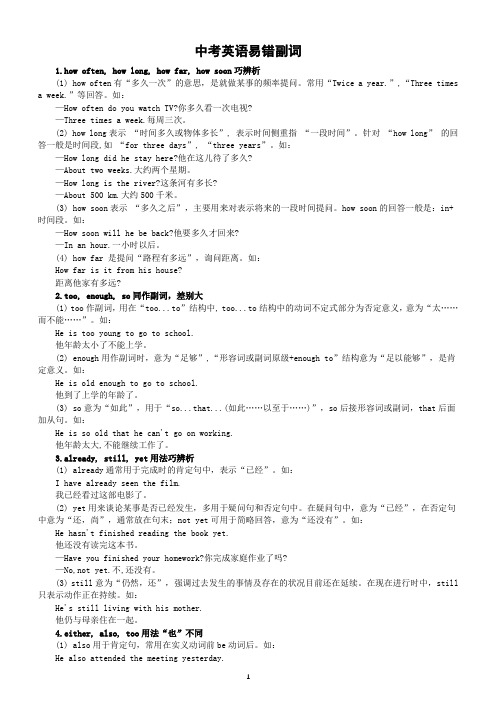
中考英语易错副词1.how often, how long, how far, how soon巧辨析(1) how often有“多久一次”的意思,是就做某事的频率提问。
常用“Twice a year.”,“Three timesa week.”等回答。
如:—How often do you watch TV?你多久看一次电视?—Three times a week.每周三次。
(2) how long表示“时间多久或物体多长”, 表示时间侧重指“一段时间”。
针对“how long” 的回答一般是时间段,如“for three days”, “three years”。
如:—How long did he stay here?他在这儿待了多久?—About two weeks.大约两个星期。
—How long is the river?这条河有多长?—About 500 km.大约500千米。
(3) how soon表示“多久之后”,主要用来对表示将来的一段时间提问。
how soon的回答一般是:in+时间段。
如:—How soon will he be back?他要多久才回来?—In an hour.一小时以后。
(4) how far 是提问“路程有多远”,询问距离。
如:How far is it from his house?距离他家有多远?2.too, enough, so同作副词,差别大(1) too作副词,用在“too...to”结构中, too...to结构中的动词不定式部分为否定意义,意为“太……而不能……”。
如:He is too young to go to school.他年龄太小了不能上学。
(2) enough用作副词时,意为“足够”,“形容词或副词原级+enough to”结构意为“足以能够”,是肯定意义。
如:He is old enough to go to school.他到了上学的年龄了。
- 1、下载文档前请自行甄别文档内容的完整性,平台不提供额外的编辑、内容补充、找答案等附加服务。
- 2、"仅部分预览"的文档,不可在线预览部分如存在完整性等问题,可反馈申请退款(可完整预览的文档不适用该条件!)。
- 3、如文档侵犯您的权益,请联系客服反馈,我们会尽快为您处理(人工客服工作时间:9:00-18:30)。
一、副词的分类
副词按词汇意义可分为:
方式副词:well,fast,slowly,carefully,quickly,suddenly,
程度副词:very, much, enough, almost, rather, quite, too,so
地点副词:here,there,out,outside, inside, upstairs, somewhere,abroad, home, near, away, back, 时间副词:today,early,soon,now,then,recently,still, yesterday, before, ago, immediately, lately, already, yet
频度副词:always,often,usually,sometimes,seldom,ever, never
否定副词:no,not,neither,nor,
疑问副词:where, how, why, how, how long其他:also,too,only
二,
注意下列副词的不同含义(一些副词与形容词同型,表示具体的含义)
high高地highly高度地wide宽的widely广泛的
deep深地deeply深深地close近地closly仔细地,严密地
1,He opened the door .(wide, widely)
2, English is in the world. (wide, widely)
3, He is sitting to me.(close, closely)
4, Watch him (close, closely)
5, The plane was flying .(high, highly)
6, I think of your opinion. (high, highly)
7, He pushed the stick into the mud.(deep, deeply)
7, Even father was moved by that film. (deep, deeply)
两种形式的副词含义迥异。
late迟,晚lately最近hard努力的,艰苦地hardly几乎不
just刚刚,仅仅,恰好justly公正地,正当地
most很,最mostly主要地almost几乎,差不多
三,其它副词比较:
1, already与yet的区别already用于肯定句句中,表示“已经”;
yet用于否定句句末,表示“还”,用于疑问句句末,表示“已经”
例如,He had already left when I called.当我给他打电话时,他已经离开了。
Have you found your ruler yet?你已经找到你的尺子了吗?
I haven’t finished my homework yet.我还没有完成作业。
注意:already还可以表示惊奇,惊讶等语气,常用于疑问句句末
例如:Has your son gone to school already?你的儿子已经上学了吗?(表示很惊讶)
2, very,much和very much.的区别
very用于修饰形容词或副词的原级;much用于修饰形容词或副词的比较级;修饰动词
要用very much.
例如,John is very honest.约翰非常诚实。
This garden is much bigger than that one.这个花园比那个大的多。
Thank you very much.非常感谢你
3.so与such的区别
⑴so修饰形容词或副词;such修饰名词,
例如,My brother runs so fast that I can’t follow him.我弟弟跑得那么快以至于我跟不上他。
He is such a boy.他是一个这样的孩子。
⑵so修饰的形容词后可以有一个单数的可数名词,其结构是“so+形容词+a/an+可数名词单数”.
such可以修饰可数名词单复数和不可数名词,名词前可以有形容词作定语,其结构是“such+a/an+形容词+可数名词单数”,“such+形容词+可数名词复数/不可数名词”,
例如,He is so clever a boy.=He is such a clever boy.他是一个如此聪明的孩子。
It is such cold weather.这么冷的天气。
(正)
It is so cold weather.(误)
They are such good students.他们是那么好的学生。
(正)
They are so good students. (误)
⑶如果可数名词复数前有many,few或不可数名词前有much,little修饰,用so不用such.
例如,so many(如此多的);so few(如此少的)可以加可数名词复数
so much(如此多的);so little(如此少的)可以加不可数名词
4.also,too,as well与either的区别
also,as well,too,用于肯定句,also常用于be动词,情态动词,助动词之后,行为动词之前;as well,too用于句末;either用于否定句中,置于句末。
例如,My father is a teacher. My mother is also a teacher.
=My father is a teacher. My mother is a teacher as well.
=My father is a teacher. My mother is a teacher,too.我爸爸是一名老师,我妈妈也是。
I can’t speak French.. Jenny can’t speak French,either.我不会说法语,詹妮也不会。
5.sometime,sometimes,some time与some times的区别
sometime:某一时间,某一时刻,可指将来时,也可指过去时
sometimes:有时,不时的
some time:一段时间
some times:几次,几倍
.例如,We’ll have a test sometime next month.下个月的某一时间,我们要进行一次测试。
Sometimes we are busy and sometimes we are not.有时我们很忙,有时不忙。
He stayed in Beijing for some time last year.他去年在北京呆了一段时间。
I have been to Beijing some times.我去过北京好几次。
6.ago与before的区别
ago表示以现在为起点的“以前”,常与一般过去时连用,不可以单独使用。
before指过去或将来的某时刻“以前”,也可泛指以前,常和完成时连用,可以单独使用.
例如,I saw him ten minutes ago.我十分钟之前看到的他。
He told me that he had seen the film before.他告诉我他以前看过这场电影。
7.now,just与just now的区别
now:与一般现在时、现在进行时、现在完成时连用,意为“现在”
just:与现在完成时、过去完成时连用,表示“刚……”
just now:和过去时连用,表示“刚才”
例如,Where does he live now?他现在住哪里?
We have just seen the film.我们刚看过这场电影。
He was here just now.他刚才在这里。
8,只能修饰原级的词,very,quite,so,too
四,副词的比较级
1, 规则变法同形容词:hard-harder-hardest, fast-faster-fastest,
early-earlier-earliest
2, 加more和most: slowly- more slowly, most slowly
quickly, carefully如此
3,不规则:well-better-best badly-worse-worst
much-more-mo6st far-farther-further
little-less-least
副词比较等级基本用法:
1,原级用法:as+副词原级+as eg: I can run as quickly as he can.
2, 比较级用法:副词比较级+than eg:I can run more quickly than he.
3, 最高级用法: (the)+最高级+in/of短语eg: Who runs fastest of the three。
